‘Our bodies are crime scenes’: South Africa’s murdered women
Tshegofatso Pule was eight months pregnant when she was murdered and her body hung from a tree on June 5, 2020. This is her story and the story of the other women murdered by men on that day in a country where a woman is killed every four hours.
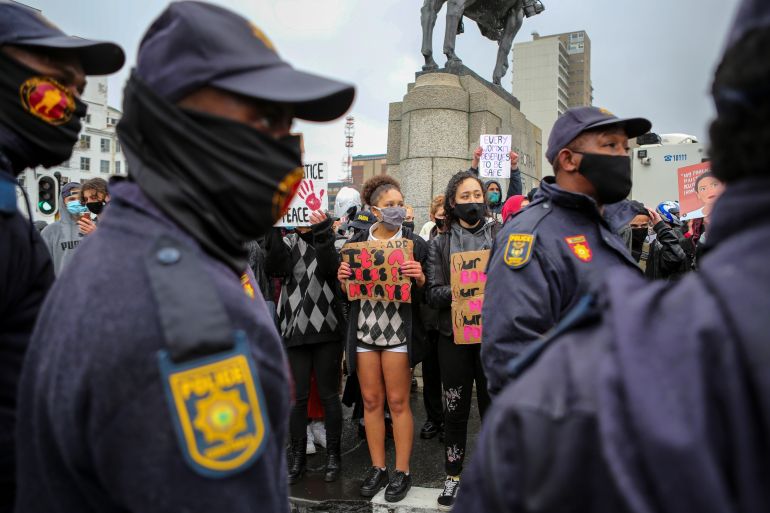
Johannesburg, South Africa – As the winter sun dipped below the horizon on a cold Wednesday evening last June, hundreds of women, men and children gathered sombrely on the streets of Meadowlands in Soweto.
Dressed in black, and clutching pink balloons and flickering candles, the crowd – some hand-in-hand, many with tears in their eyes – made their way to the home of Tshegofatso Pule, the words of an old anti-apartheid struggle song echoing in the air around them.
Keep reading
list of 4 itemsMurder of woman in Kyrgyzstan triggers bride kidnapping protests
Online violence is silencing women journalists
‘Kuwait is unsafe for women’: Outrage over brutal murder of woman
“Senzeni na, senzeni na (what have we done?),” they sang, paying their final respects to a life lost too soon. It would be the first of many gatherings in her name.
Five days earlier, on June 5, 2020, a group of residents from Durban Deep in Roodepoort, a residential area seven kilometres (four miles) from Meadowlands, stumbled upon a spine-chilling sight: the lifeless body of a heavily pregnant woman, blood dripping from her torso to her toes, hanging from a tree in broad daylight.
They made multiple phone calls to other community members but their efforts failed to identify her. So the group of men took pictures and videos of the gruesome scene and started circulating them on social media. “The footage was posted to try and find her family,” said one witness, Tshepo Bodibe, who had been summoned to the crime scene by a friend.
On June 8, the devastated family of Tshegofatso, who had been searching for their daughter for days, saw the gut-wrenching viral video of a woman hanging from a withered grey tree. They recognised her as their ‘Tshego’, as she was affectionately known.
The 28-year-old had been eight months pregnant when she was shot in the chest and then hanged.
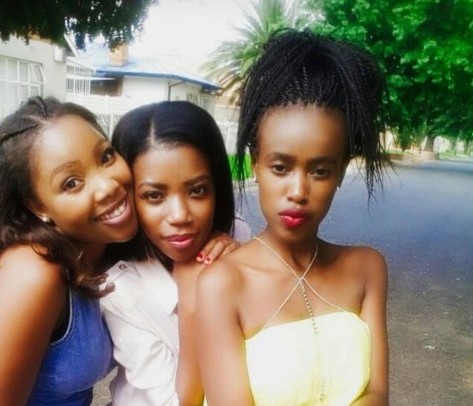
“Nothing could ever prepare you for this,” says Tshego’s childhood friend, Zinhle Zwane, as tears well up in her eyes. A distraught Zinhle had first shared the news of her friend’s gruesome death on Twitter. It sent shockwaves across the country, sparking outcries from women, politicians and celebrities.
Among those who took to social media to express their shock in the wake of the killing was former Miss Universe, Zozibini Tunzi, who tagged the South African president in a tweet, expressly saying “I am not okay! This is not okay! Mr President, we are dying!”
Zinhle’s smile perseveres across her tear-stained face as her mind wanders back to the good memories she shared with her friend. The pair met 22 years ago when they were just six years old. Their mothers before them, had also been close friends. But the line is now cut; her child will never get a chance to be friends with Tshego’s daughter, who died in the womb along with her mother that day.
“As women, we are not safe. We can fight, march and raise awareness, the reality is that we are not safe,” Zinhle says.
One of eight women
In South Africa, a woman is killed every four hours. On June 5 last year – the day Tshego was killed – she became yet another statistic: one of eight women brutally murdered by men in South Africa that day.
We know the names of two of the others: Luyanda Nkambule, 29, whose life was cut short in her home in Secunda, Mpumalanga province, and Nompumelelo Tshaka, 45, who was mutilated and her body discarded in Mthatha, in the Eastern Cape.
For two of the others, we know a bit of their story: in KwaZulu-Natal, two young nurses were brutally killed on their way home from St Apollinaris Hospital, allegedly by an ex-boyfriend of one of the victims.
But the other three are merely numbers. The grim reality is that femicide is grossly underreported in the media, and police reports often strip victims of their identity, turning them into statistics.

According to the human rights organisation, Centre for Constitutional Rights, the femicide rate in South Africa is five times the global average. In the first two weeks of June 2020, 21 women were reportedly murdered by men in the country. But we may never know the names, faces and stories of all of them.
For South African women, the familiar feeling of fear and collective trauma has shown itself in desperate pleas on social media, urging the government to take action against femicide.
Days following the public outcry after Tshego’s killing, President Cyril Ramaphosa released a statement condemning the surge in violence against women and children in the country. In the statement, he urged communities to “end the culture of silence and speak up”, adding “it could save your lives”.
But for many young South African women, like Beloved Sechele, his words rang hollow. The law student replied under his statement posted on Twitter, “This is dismissive and hurtful because we have articulated our troubles and reported many times.” She went on to say, “We are literally suffering and this feels like yet another brush-over of our concerns.”
Her sentiments were echoed by Monique Smith, a political science student at the University of Pretoria, who fired back in the Twitter comments, “Mr President has shown that when he wants to [tackle an issue] he will.” She continued, “Look at how he worked with many different leaders to try to minimise the impact of COVID-19. How quickly laws and bans were enforced. He doesn’t give gender-based violence the same energy because he doesn’t want to.”
Tshego: ‘She lit up the room’
Makhotso Mahlatsi is a spirited, bubbly student. She was a good friend of Tshego’s and spoke to her just a few days before she was murdered. “We were talking on the phone when she heard my boyfriend’s voice in the background and thought he was talking to her, she then teased him for ‘butting’ into our conversation and we all laughed.”
Her voice quivers while recounting their final chat, “That was Tshego, you could never stay mad at her.”
Makhotso met Tshego a few years ago when they worked together in a shop. “I definitely initiated the friendship. At first, I thought she was shy, but once I really got to know her, I saw her outgoing, loud and hilarious side, and I loved it.”
Her heartache still palpable, she continues, “You know how people say someone ‘lights up a room’, that was literally Tshego.”
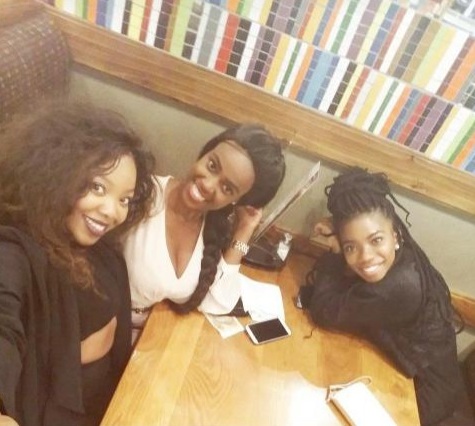
Friends say Tshego often gushed about the fact that she was expecting a little girl, and had already picked out a name. Those closest to her say she was excited to be a mother and was planning a baby shower for June 27. In fact, on June 4, the day she left her Meadowlands home before she was killed, Tshego had told her family and friends that she was meeting her then-boyfriend, Ntuthuko Shoba, to buy clothes for their baby.
Later that night, Tshego had apparently sent a message to a friend, telling her that she “just wanted to come home”. Her friends surmise that the couple might have fought. Security camera footage taken just before 10pm outside Shoba’s Westlake apartment complex in Florida, Roodepoort, 7km (four miles) away from where Tshego’s body was discovered, painted an ominous picture of her final moments. Tshego can be seen leaving his apartment and seemingly voluntarily getting into a grey Jeep in the cold dark of the night. Shoba is nowhere to be seen in the footage, but he would later inform the police about the security cameras in his apartment complex, in the early days of the investigation.
Following weeks of protests and mounting pressure, the South African police launched a manhunt and apprehended the driver of the now infamous grey Jeep, a 32-year-old man named Mzikayise Malephane.
On February 19, 2021, eight months after he was arrested, Malephane stood in a Johannesburg courtroom and pleaded guilty to charges including murder, obstruction and unlawful possession of a firearm. He was sentenced to 20 years in prison, but this was not the end of the case.
According to the plea agreement read out by his lawyer, Malephane claims he was offered R7,000 ($490) to carry out the killing but declined, only agreeing to do it when the offer went up to R70,000 ($4,900). Armed with this information, investigators swiftly moved to arrest the man implicated as the mastermind behind the murder: Tshego’s 33-year-old boyfriend and the father of her unborn baby, Ntuthuko Shoba.
Two days after the confessed killer Malephane was sentenced, Shoba stood in the dock for the first time facing murder, obstruction and conspiracy to commit murder charges. Clean-shaven in a black suit, the former Johannesburg Stock Exchange analyst appeared composed. During his bail application, the state alleged it had proof that on May 29, 2020, Shoba called Malephane 11 times and then a further 23 times using an unregistered sim card on June 4, 2020, the day that Tshego went missing. With that, his first bail application was denied.
On May 7, 2021, Shoba stood in court once again, in a second bid to be released on bail. But Magistrate Delize Smith denied his second application, telling the court that it would not be in the interest of justice to release him. Many women in the public gallery, including members of the ruling African National Congress party’s Women’s League, relatives, neighbours and friends of Tshego, could be seen and heard rejoicing, ululating and crying.
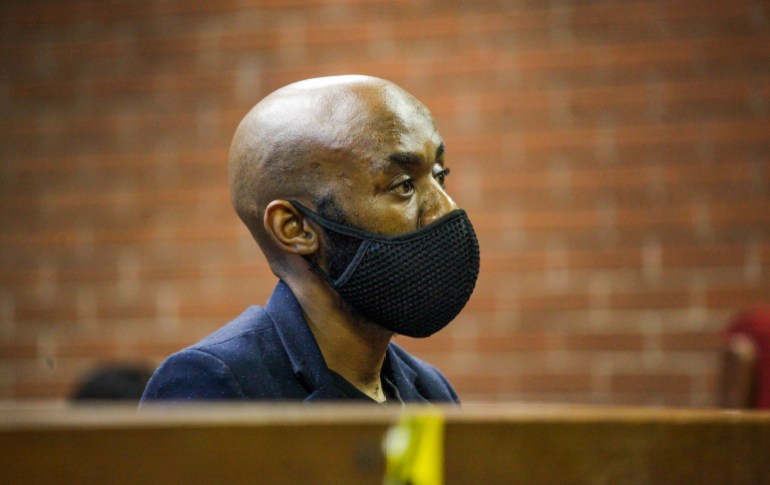
Athandwa Gumbi sat on the pavement with a small group of young women who had been singing outside since the court proceedings commenced. The group had come to support Tshego’s family as well as to protest more generally against gender-based violence. Her eyes red and swollen from crying, the 20-year-old university student said she lives in fear.
“Our bodies are just crime scenes, a place for men to violate and discard us in the bushes beneath shallow graves … South African women are not safe.” Taking her mask off to wipe her face with a tissue, she continued, “The worst part is, you just don’t know when it will be you.”
Nompumelelo: A beloved sister
On the same day that Tshego’s lifeless body was discovered, a passer-by found the body of a 45-year-old woman in an open field in Mthatha, Eastern Cape province. Nompumelelo Tshaka had been brutally murdered with an axe, her face crushed and left on display. According to her brother Andile Tshaka, the crime scene was so gruesome that the police first called to the site were sent for counselling.
Her family still reels from the aftermath of losing their beloved sister and daughter.
According to police spokesperson, Captain Khaya Tonjeni, investigators had moved swiftly to arrest Ayanda Zenani, a 36-year-old man who was alleged to have been Nompumelelo’s boyfriend.
On June 18, the magistrate’s court in Mthatha heard and denied Zenani’s bail application. In the wake of public outcries about the prevalence of femicide, Lieutenant General Lisiziwe Ntshinga, the police commissioner of the province, released a statement promising to make an example of the man suspected of killing Nompumelelo.
Almost 10 months later, Zenani was sentenced to 20 years in prison for the horrific murder. Nompumelelo’s brother, Andile says the profound loss was a painful experience that continues to devastate their entire family.

Rosie Motene, a Pan-African queer feminist and author, believes that at the root of femicide is the fact that patriarchy is entrenched in institutions that are meant to protect the vulnerable. “I know from experience how difficult and traumatic it is to deal with the South African Police Service in pursuit of protection,” she says. “On many occasions, we have had to spend hours pleading with the police to open a case against a violent perpetrator.”
Through her organisation, Letsatsi Healing Space, Rosie provides services to help marginalised women open cases against perpetrators of violence and get protection orders.
“I think we need to be intentional about demanding change and smashing the patriarchy in our legal system, in the media and society at large,” she says.
Xolie Mngadi, a performing art gender-based violence activist at the Campus of Performing Arts in Durban, KwaZulu-Natal, believes that misogynoir makes up the fabric of South African society to the extent where, “Institutions that are meant to protect and take decisive action against atrocities committed against women, are simply too incoherent to function.” She continues, “There is no chance that women can stop femicide, while at the receiving end of violence. The onus is on the government to interrogate the ineffectiveness of current efforts, if any.”
Luyanda: ‘She had an infectious smile’
With an enigmatic smile and beautiful eyes, Luyanda Nkambule was, by all accounts, an ambitious young woman. On June 5, 2020, her fate was forever intertwined with that of Tshego, Nompumelelo, and the five other women whose lives were senselessly stolen in South Africa that day.
Secunda is a coal mining town in the Mpumalanga province. Luyanda was a resident of Tuscan village, a tight-knit community. The 29-year-old student was discovered by her flatmate at about 5:45pm, lying in a pool of blood, with an electric cord tied around her neck.
According to the police, it appears she was murdered during a house robbery because some of the victim’s valuables were taken, including a laptop, house keys and two mobile phones. Captain Gerhard Elmes, the spokesperson for Secunda Police, described the scene as truly horrendous.
Mbalenhle Mabuza is a waitress and blogger. On that sunny Saturday morning, she planned to go to work when she got a phone call from a mutual friend she shared with Luyanda. The voice on the other end of the line broke the news. She was devastated, “I called my manager and asked for the day off because it was just too painful to fathom.”
When not at work, Mbalenhle spends her days taking pictures of her food, the places she travels to, and doing natural hair styling tutorials. She remembers her younger days with Luyanda at her side when the two attended the same primary school and stayed together at a boarding school in White River. Mbalenhle giggled a little recalling how Luyanda would get into trouble for laughing out loud during school assemblies.
She fondly described her friend as a breath of fresh air. “She was bubbly, and silly with a huge heart and an infectious smile … you can see it in all her pictures.”
“There is no one in this world that she adored more than her little brother.”
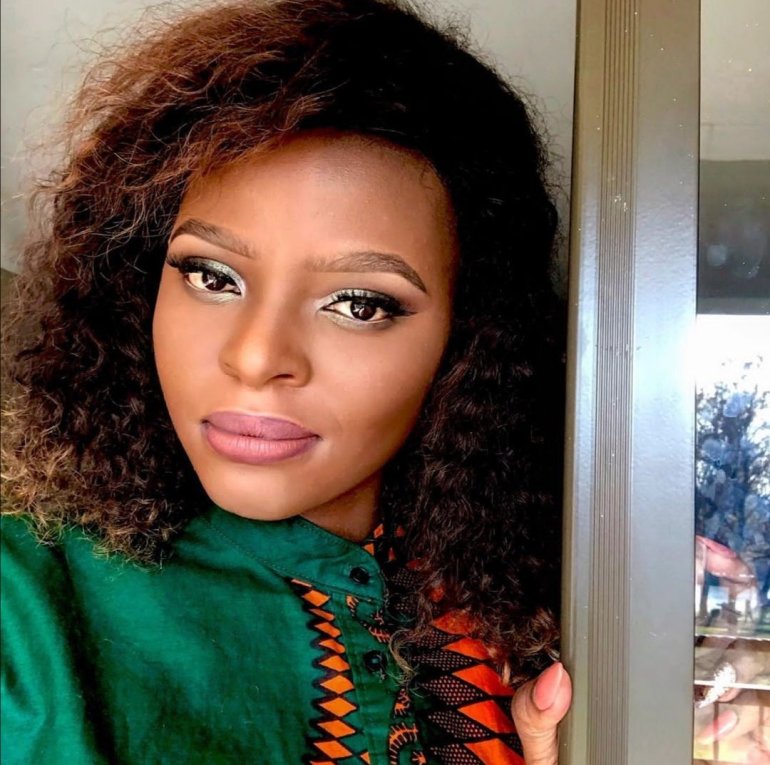
When South Africa went into lockdown in March last year due to the coronavirus, Luyanda got creative and started planning a book club, Mbalenhle said. She challenged her friends to read 50 books by December.
Mbalenhle cannot stop herself from laughing as she remembers their last conversation and how they spoke about the importance of being financially independent but never shying away from being spoiled. Their mantra, Mbalenhle explained, was “Black women deserve everything”.
‘Killed with no repercussions’
Families and friends of South Africa’s femicide victims mourn their loved ones, as every day the number of women killed gets higher. Meanwhile, activists continue to put pressure on the government to take decisive action, pointing out that the actual number of femicides is likely to be twice as high as the number reported.
Bafana Khumalo, of Sonke Gender Justice, a non-profit that tackles gender-based violence, said women are not just falling off the face of the Earth, but are deliberately “being killed by men while the government lacks the political will to end the massacre”.
Al Jazeera contacted the director of communications in the Department of Women, Youth and Persons with Disabilities for comment on the scourge of violence against women in South Africa, but did not receive a response before publication.
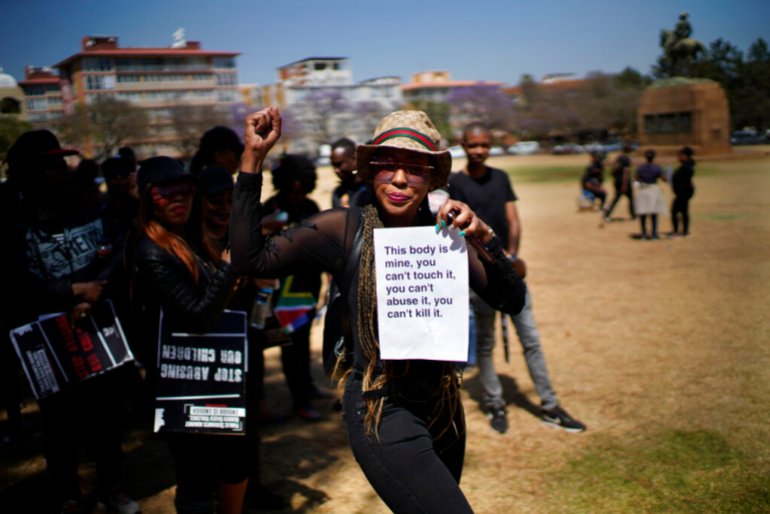
Gender-based violence on-campus campaigner at the University of Johannesburg, Sezikhona Phakade, said the problem in South Africa is that men know they will get away with it.
“Impunity is the biggest enabler of crime, what would impede men from murdering and violating us when there’s only a three percent chance that they will be prosecuted for it?” she asked.
Phakade alludes to the fact that the Minister of Police, Bheki Cele, announced that only 130 of the 4,058 people arrested for alleged gender-based violence (GBV) in March 2020, had been convicted. This includes cases such as femicide, assault with intent and other forms of physical violence, and it means that the conviction rate for violent crimes against women is only three percent.
In addition, Phakade argued, “Apartheid and colonialism left a legacy that says Black women do not own their bodies, that we do not deserve to live on our own terms, and that we can be killed with little to no repercussions.”
Zimasa Mpemnyama, a Black feminist writer, says: “Despite South Africa making great strides since the dawn of democracy, the lingering cultural impact of apartheid is best illustrated by the level of misogyny that is grossly normalised and society’s attitudes towards women and particularly Black women.”
A year after the heinous murder of Tshego and her unborn baby, all that remains for her family, friends and the community of Meadowlands are memories and a fight for justice.
Tshego’s best friend smiles as she remembers their last conversation, “She wanted to have a water birth, so I was playfully scaring her about labour pains”. After a short pause, she adds, “I still listen to our voice notes. I miss her every day.”
For South African women, all that is left are struggle songs and the lingering thought, “Am I next?”
And when the next does come, they will wear black clothing, hold candles and walk towards the home of another woman whose life has been stolen, singing: “Senzeni na (What have we done?), Senzeni na kulomhlaba? (What have we done in this country?)”